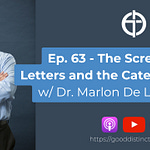NOTE: THIS EPISODE WAS PUBLISHED BEFORE OUR REBOOT. willwrightcatholic.com is now gooddistinctions.com
Are Faith and Reason at Odds?
Materialist atheists view the world as being composed of matter, its movements, and modifications, and nothing else. Religious fundamentalists and literalists see the world in a monochromatic view based on the biblical texts (i.e. - seeing Genesis as a literal scientific explanation of the creation of the world). The former seem to embody “reason” and the latter embody “faith.” However, I hope to show that the materialist atheists are not using the gift of reason well nor are the biblical fundamentalists understanding the gift of faith. When held clearly, faith and reason are not opposed to one another. In fact, they are incapable of being at odds, when properly understood.
Scientism
I want to begin by looking at a prevalent error in popular society: scientism. Science is an incredibly powerful tool for exploring the world around us. In many ways, it is the tool for discovery given the most credibility by intellectuals in the modern world. This credibility is sometimes so strong that we are led to a sort of scientism in which science is the only tool for discovery worth utilizing, the only one which is trustworthy. Where does this notion come from?
Philosophically, there are two prevailing theories which have taken over much of academia: naturalism and materialism. Naturalism is the philosophical belief that everything arises from natural properties and causes, and supernatural or spiritual explanations are to be excluded or discounted. There is an even harder stance than naturalism called materialism which holds to the doctrine that nothing exists except matter and its movements and modifications. In either case, the material and natural are all that are accounted for and the supernatural is disregarded at best and rejected at worst.
Naturalism and materialism lead to the error of scientism, which is self-refuting. Put basically, scientism suggests that the only things of which we can be certain are those things which are subjected to the scientific method. The crippling problem with scientism is that the scientific method cannot be applied to the scientific method. Therefore, this worldview begins with an unverifiable premise.
Again, science is an incredibly powerful tool for exploring the world around us and learning more about the composition, movement, and modification of matter. Though, science is unable to answer other important questions: What created the universe? Why is there something rather than nothing? What is the nature of being itself? What is personhood? All of these questions require different tools of discovery than science.
Tools of Discovery
Beyond science, what tools of discovery are at our disposal? First, we can begin with philosophy. Modern philosophy is remarkably convoluted and rife with scientism, un-based skepticism, and other rational landmines. But, the long patrimony of philosophy allows us to ask questions like: What is the nature of being (metaphysics)? How do we come to know things (epistemology)? What makes a thing good, virtuous, or valuable (axiology)? How do we know that conclusions follow from certain premises (logic)? These are fundamentally different questions than science could ever ask or answer, but how many of us would truly argue that these questions are unimportant? So far, all of these questions, while different from science (and along with science), would fall under the broader category of human reason.
Theology
The study of God and of the things of God is called Theology. As long as there have been human beings asking questions of consequence, there have been questions and statements of a theological nature. It is only recently in human history that naturalist and materialist sentiments have disregarded or rejected the supernatural. When thinking of how we could apply the tool of discovery of Theology, I am reminded of the words of Galadriel to Frodo in Tolkien’s Fellowship of the Ring: “May it be a light to you in dark places, when all other lights go out.”
In the Catholic patrimony, the realm of Theology arises from what God has revealed about Himself through Sacred Scripture and Sacred Tradition, but it also includes what is called natural philosophy. Many of the classic arguments for the existence of God come not from St. Augustine or St. Thomas Aquinas, but from Plato and Aristotle. More needed to be revealed to arrive at the truths expounded by Christianity, but Plato and Aristotle were able to apply human reason so keenly that they arrived at faith in God (as they understood Him).
Are Faith and Reason Compatible?
So, are these various tools for discovery actually compatible with one another? Ultimately, are faith and reason compatible? St. John Paul II put it this way:
“Faith and reason are like two wings on which the human spirit rises to the contemplation of truth; and God has placed in the human heart a desire to know the truth—in a word, to know himself—so that, by knowing and loving God, men and women may also come to the fullness of truth about themselves (Fides et Ratio, 1).”
Faith and reason are, therefore, both gifts that God has given to human persons to rise to the contemplation of Himself, who is Truth itself, and truth about ourselves. So, faith and reason are more than merely compatible; they are complementary. St. Thomas Aquinas rightly says that the light of reason and the light of faith both come from God, therefore there can be no contradiction between them.
We need Faith because without it, we would be lost and without direction. We need Reason because without it, we would be lost to our emotions and blind whims.
What is Reason?
Reason is the God-given gift of rational thought. Beyond mere reaction, we can come to the knowledge of things, events, and persons through thought and observation. Like Faith, this second wing of the human spirit, leads us to know in order that we might act. We know and we love. We believe and we act.
Lest we think that reason is somehow more rigorous than Faith. We must reject the notion that the only tool of reason is science. Science is an incredibly powerful tool to investigate the material world. What exists and how does it exist? Science, however, can never answer the question, for example: why do we exist at all? For these questions, we might use the tool of philosophy.
Reason also prepares the way to faith. St. Clement of Alexandria said long ago that philosophy is a “stepping stone to faith (cf. FR 38).” At the same time, we must learn as Pope Benedict XVI taught that human reason alone is weak; it needs faith to elevate it. God’s grace builds upon our nature.
What is Faith?
Faith means to trust in God. Faith is belief. What we believe, contained in the Creeds of the Church, for example, can be referred to as Faith. The entirety of the Catholic religion can be called the Faith. Faith is not believing in something irrationally. There is a great amount of evidence for God and the truth of the claims of Christianity.
The Gospels are historically reliable. The Resurrection of Jesus Christ is well attested. And the last two thousand years establish how well founded the Faith of the Christian religion is. The Catholic Church is the Church of Jesus Christ. Jesus Christ is God. God exists. On these three levels of God, Christ, and the Church, we have Faith.
The tenets of the Faith lead us to assent in belief to God and to trust Him. This intellectual way of coming to know God moves our free will towards love of Him. Of course, this requires trusting the Church, trusting the saints and holy writers of the past, and trusting in the testament of Tradition, written, or orally handed down to us. In this way, we are trusting what we ourselves have not seen personally, but it is certainly rational to trust such a firm witness.
As St. John Paul II put it:
“Men and women can accomplish no more important act in their lives than the act of faith; it is here that freedom reaches the certainty of truth and chooses to live in that truth (FR 13).”
Truth is True, Regardless of Feelings
Certain things exist in a certain way and our feelings on the matter do not change that reality. There are certain things which are always true, always and in all places. We might refer to these as “principles.” The application of these principles can be many and varied, but the principles themselves might not change.
When the Church teaches on a matter which pertains to Faith or Morals, the teachings can develop but they will never change. These truths point to the nature of God, of man, and of the created order. In all of these principles and applications, the truths do not change. However, they are discovered by means of either faith or reason. Because faith and reason both are at the service of the truth, they cannot contradict. If we believe that something is in error, then either our reason is faulty or our understanding of a teaching of the Faith is faulty.
Reason can show that God exists and lays a foundation that makes faith credible. Therefore, reason is a common ground between believers and non-believers. Faith without reason is myth or superstition. Without reason, faith is only feelings and experience. If this happens, then universality of truth is lost.
How to Know if We are in Error?
How can we know if we are in error? Could the Holy Spirit point us in a direction which seems like a logically poor decision or lead us into error? The answer is no. The Holy Spirit is the third Person of the Holy Trinity. The Holy Spirit is God. God never wants to deceive us.
If we have a strong indication that God is leading us in a certain direction, we must figure out why we think that. And, if we feel that logic dictates a different path, we must figure out why we think that. In other words, are we cooperating with the gifts of faith and reason properly?
Investigating human reason, we look at arguments to ensure that they are valid. Does the conclusion necessarily follow from the premises? If the argument is sound, however, then the conclusion will be valid if the premises are true. It is possible that we have an improper understanding of something. This can affect us greatly because we might think that something is logical, but our arguments are bad or our premises are wrong.
Investigating our understanding of the Faith, we must think with the mind of the Church. What does the Church teach on Faith and Morals? We must form our conscience well and learn as much as we can about Church teaching.
Ideally, when we are investigating or discovering, we are aiming at the truth. As Pope Benedict XVI put it,
“In the irresistible desire for truth, only a harmonious relationship between faith and reason is the right road that leads to God and to the person’s complete fulfillment (Gen. Audience, Nov. 21, 2012).”
He also thought there was a “fertile connection” between understanding and believing. Even the field of Theology which studies the things of God and God Himself is classically defined as “faith seeking understanding (fides quarens intellectum).”
What to Do with a Supposed Contradiction?
What, then, should we do with supposed contradictions? We must begin by remembering that God never wants to deceive us. He’s not trying to trick us. If we come up against a supposed contradiction where reason seems to be saying one thing and faith is saying another, then necessarily our understanding is wrong as it regards either reason or faith. So, we must diligently investigate our premises and data points, pray, ask for guidance, or research the answer from someone who has wisdom and insight. What we cannot do is act in a way which seems truly illogical, and we cannot act against something we feel convicted by the Holy Spirit to do or not do.
We Need to Live in the Truth and With Love
God has given us the gifts of reason and faith to come to knowledge, love, and service of Him and of those placed around us. We must never lose sight of why we have these various tools of discovery. It is all about the love of God and neighbor.
When we study science, we should do so out of a sense of wonder and awe at God’s creation and His majesty. And any application of what we learn should be at the service of the common good of humanity. Likewise, when we use the tools of philosophy and theology, we must bear in mind that these are tools of discovery, not of innovation. The truth belongs to Jesus Christ. He alone is the Way, the Truth, and the Life. Our job is not to hijack reason or faith, but to harmonize the two wings and let God’s grace draw our souls ever upward into His own blessed life.














Share this post